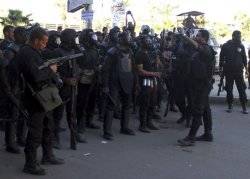Human Rights Watch has denounced the arrest of a prominent Egyptian activist during a raid by security forces on a domestic human rights organization, which it described as a continuation of a crackdown on dissent.
Police broke into the offices of the Egyptian Centre for Economic and Social Rights late Thursday and arrested six of its members who were blindfolded and detained in an undisclosed place for nine hours. Five of them were later released.
Mohamed Adel, a founding member of the April 6 movement that contributed to the 2011 revolt against Hosni Mubarak, remains in custody.
Police have in the past three weeks also gone after three other prominent activists of the Egyptian protest movement; Alaa Abdelfattah, Ahmed Maher and Ahmad Douma.
Sarah Leah Whitson, the Middle East and North Africa director at HRW, said the pursuit of the activists is a deliberate effort to target "voices who demand justice and security agency reform".
"It should come as no surprise that with the persecution of the Muslim Brotherhood well underway, the Ministry of Interior is now targeting leaders of the secular protest movement," Whitson said in a statement released on Saturday.
"The Egyptian government has sent a strong signal with its attack on a human rights group, and these arrests and prosecutions, that it is not in the mood for dissent of any kind," Whitson said.
Anti-protest law
With Adel's arrest, the number of prominent political activists arrested by Egypt's security forces in the past three years has risen to a total of five.
Ahmed Maher, founder of the April 6 youth movement and a 2011 nominee for the Nobel Peace Prize, is among those put in jail since the government passed a law outlawing the calling for protests without first attaining approvals from the Ministry of Interior.
Along with Adel, Maher and activist Ahmed Douma are on trial on charges relating to a protest on November 30, with a verdict scheduled for December 22.
Prosecutors also recently referred Alaa Abdelfattah, one of the most vocal critics of the police and the military, to trial on charges of organizing a demonstration without notification.
Human Rights Watch accused the police of using "the deeply repressive" law to arrest scores of political activists on grounds that they failed to seek advance permission for their demonstrations.
"The government claims that, instead of criminal penalties, the new law sets fines - of 10,000 - 30,000 Egyptian Pounds (US$ $1,500 - 4,300) under article 21 - for failing to get advance permission," the HRW statement said, adding: "Yet the new law incorporates the existing restrictive assembly laws, including Law 14 of 1923, which carries with it a prison sentence for participation in an unauthorized demonstration."
PHOTO CAPTION
Egyptian security forces gather during clashes with supporters of ousted Egyptian President Mohamed Mursi at El-Talbyia near Giza square, south of Cairo, December 6, 2013.
Aljazeera


 Home
Home Discover Islam
Discover Islam Quran Recitations
Quran Recitations Lectures
Lectures
 Fatwa
Fatwa Articles
Articles Fiqh
Fiqh E-Books
E-Books Boys & Girls
Boys & Girls  Hajj Rulings
Hajj Rulings Hajj Fatwas
Hajj Fatwas














